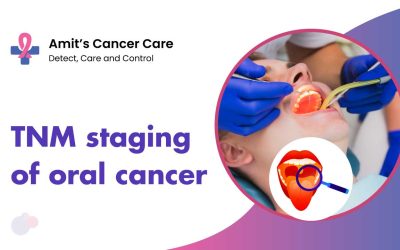Oral cancer is a serious and potentially life-threatening disease that affects millions of people around the world. TNM staging is a system used to categorize the extent of the cancer and determine the best treatment plan for the patient. Understanding the TNM staging system for oral cancer is critical in order to understand the severity of the cancer, what treatment options are available, and what to expect during the treatment process.
In this blog, we will provide an in-depth explanation of the TNM staging system for oral cancer. We will discuss each stage of the system, what it means, and what factors are considered in the classification.
Whether you have been recently diagnosed with oral cancer, or you are a healthcare professional looking to expand your knowledge on this topic, this blog will provide valuable information that can help you make informed decisions about your treatment plan. So, let’s dive in and learn more about the TNM staging system for oral cancer.
What Is Oral Cancer Staging?
Oral cancer is a type of cancer that affects the mouth, lips, tongue, and other parts of the oral cavity. It can arise from a variety of cell types including squamous cells. In order to accurately diagnose and treat oral cancer, doctors use a system known as TNM staging which breaks down patients’ diagnoses into four categories: tumor (T), lymph node (N), metastasis (M) and stage grouping.
By using this system to identify the severity of the cancer, doctors can better personalize treatment plans for each patient and increase their chances of a successful outcome. Additionally, TNM staging helps determine eligibility for certain clinical trials and increases overall awareness about oral cancer prevention and early detection.
T Staging
T Staging is the first step in determining how far or advanced oral cancer has become. This stage analyzes the size and location of a tumor to determine its severity. T1 tumors tend to be smaller than 2 cm and are located in only one area of the mouth, while T4 tumors can measure up to 4 cm or more, and may have spread from one area to another. Doctors may also consider whether nearby tissues or lymph nodes have been affected by the tumor while making this determination. It is important that doctors complete a full assessment before proceeding to other stages of diagnosis in order to ensure an accurate diagnosis and successful treatment plan.
N Staging
N Staging is the second step in determining how far or advanced oral cancer has become. This stage evaluates whether or not cancer has spread to nearby lymph nodes. N0 tumors have not spread, while N1 tumors are small and have spread to nearby nodes. N2 tumors are larger and have spread more extensively to multiple nearby nodes. Lastly, N3 tumors have spread even further, beyond the local area into other parts of the neck.
It is important that doctors complete a full assessment before proceeding to other stages of diagnosis in order to ensure an accurate diagnosis and successful treatment plan.
M Staging
M Staging is the third step in determining how far or advanced oral cancer has become. This stage evaluates whether or not cancer has spread to other organs in the body, such as the lungs and liver. M0 indicates that the tumor has not spread, while M1 indicates that it has spread to distant organs.
Read also:
1. Cost Of Oral Cancer Treatment In Mumbai
Overall Staging
Overall Staging is the final step for determining the stage of oral cancer. Doctors take into account each individual stage – T (tumor size and extent of growth), N (regional lymph node involvement), and M (distant metastasis) – to arrive at a comprehensive determination. The combined stages can range from Stage I to Stage IV depending on the severity of the cancer, with higher stages indicating more advanced tumors and treatment options varying accordingly.
To determine an overall stage is essential in order to inform appropriate treatment options and prognosis.
Treatment Options for Oral Cancer
Treatment options for Oral Cancer vary based on the stage of cancer that has been determined.
For early stages (Stage I and Stage II), surgery is the recommended option to remove any tumors and/or lymph nodes that may have cancer cells.
For late stages (Stage III and Stage IV), more treatment options may be explored such as radiation, chemotherapy, targeted therapy or a combination of these treatments.
Depending on the type of tumor, doctors might also suggest immunotherapy, an experimental approach where drugs boost a patient’s own immune system to fight off cancer cells. Regardless, it is important to note that the stage of cancer ultimately affects the type of treatment recommended as higher stages typically call for a variety of treatments rather than just one.
Coping with an Oral Cancer Diagnosis
Being diagnosed with oral cancer is a difficult experience that can leave individuals feeling overwhelmed and scared. It is important to remember that there are treatments available and it is important to stay informed.
Take time to learn as much as you can about the type of cancer you have and what treatment options are available. This will help in decision making and make sure you understand the implications of any treatments being considered.
Seek out support groups or counseling if needed, as talking through issues can be therapeutic. There may also be resources specific to your type of cancer, so look for organizations that might specialize in providing help or advice.
Finally, maintain your daily routine and take care of yourself during this difficult journey. Exercise, eat a nutritious diet, get enough restful sleep and practice relaxation techniques such as yoga or meditation to help manage stress levels.
In conclusion, oral cancer is a serious condition that requires prompt diagnosis and treatment. It is essential to understand the stages of oral cancer, which are determined by looking at T (tumor size), N (lymph node involvement), and M (distant metastasis).
Treatment options depend on the stage of the tumor, so it’s important to be informed when considering the different types of treatments available. With proper care and support, many individuals can live long, healthy lives after an oral cancer diagnosis.






